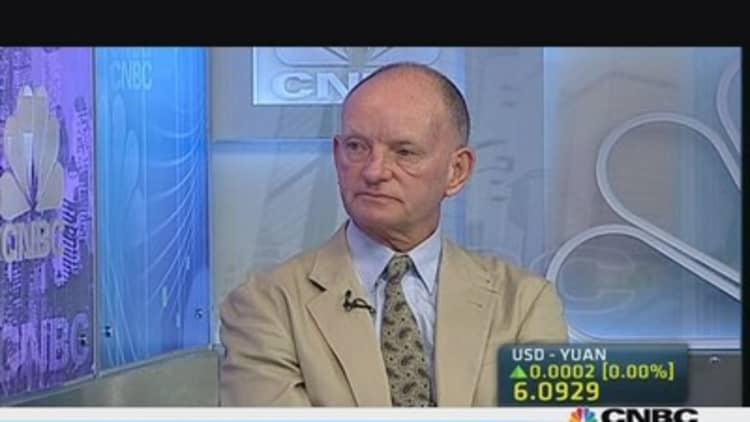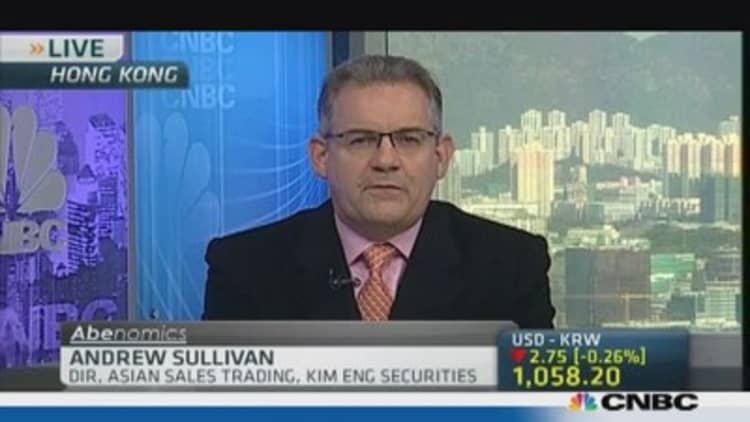Talk of further monetary stimulus from the Bank of Japan helped push the yen to a six-month low and lifted the Nikkei to a six-month high on Tuesday, and the move in Japanese assets may have further to run, analysts say.
Comments made by Bank of Japan (BOJ) governor Haruhiko Kuroda on Monday fueled speculation of further easing, after he told participants at a conference "we are ready to adjust monetary policy without hesitation if risks materialize."
The dollar-yen hit a six-month high of 103.37 per dollar in Asia on Tuesday, while stocks powered to their highest level since 2007 to close at 15,749 on Tuesday. Better-than-expected U.S. economic data increased expectations of a near-term tapering of the Federal Reserve's asset-purchase program also helping to boost the dollar-yen.
(Read more: Goldman most upbeat on Japan, Europe stocks in 2014)

Japan's domestic currency and its stock market are closely correlated as a weaker currency is good news for the nation's exporters.
Analysts said easing expectations could be realized in the next six months.
"The BOJ will have to act when demand and prices are weakening again. Both domestic demand and price trends have likely reached a plateau, so any deterioration of business conditions, either during the tax hike next spring or in the international environment, will trigger further quantitative easing by the BOJ," said Martin Schulz, a senior economist with the Fujitsu Research Institute, adding that he expected the bank to expand its stimulus program in May.
(Read more: Can Japan kiss deflation goodbye?)
Meanwhile technical analysts told CNBC they also saw Japan's stock market powering higher.
"The Nikkei is going to be heading north quite strongly," technical analyst Ray Barros, CEO of Ray Barros Trading Group told CNBC. "We've just taken out the upside resistance level of 15,000. If we can take that out I'd be looking for 17,000," he added.
However, other analysts said they were less convinced that the Nikkei's recent winning streak was here to stay.
Mark Konyn, CEO of Cathay Conning Asset Management, told CNBC Asia's Cash Flow he expected the momentum behind Japanese stocks to continue in the short term, but in the absence of a real improvement in inflation expectations, future gains would likely be limited.

"In the short term there is probably further to run particularly with a weaker yen and slightly improving numbers on the inflation front, but beyond that we are going to need to see a real adjustment in terms of inflation expectations which we haven't seen yet," said Konyn.
(Read more: Rich Chinese to snap up property... in Japan?)
Japan's financial markets have seen a turnaround this year, ever since Prime Minister Shinzo Abe launched his ambitious late last year to haul the economy out of an over a decade long period of deflation. His plan, which involves aggressive easing, fiscal stimulus and structural reform has helped power stocks over 51 percent higher year-to-date, while the yen has weakened around 19 percent against the dollar.
But Konyn added that investors needed to remember that the Bank of Japan did not have limitless means to prop up the economy.
"We're going to need to see wage inflation over the next six months, because if you look at the Bank of Japan and its ability to keep on expanding its balance sheet, it's going to run out of powder within the next six to seven months before it reaches limits where it isn't able to go any further, so we really need to see those expectations change," he added.
Meanwhile David Roche, global strategist at Independent Strategy, also told CNBC he was also concerned about Abenomics working out in the long term.
(Read more: Can Japan's answer to WhatsApp take on the world?)
"It [Abenomics] will run out of steam by next May because it won't deliver on supply side reforms," he said.
"Without the market reforms, there is no miracle in Japan and the market will wake up to this when the consumer has finished spending ahead of the consumer tax price increase in May and then the whole thing will fall back," he added, referring to the upcoming hike in sales tax to 8 percent from 5 percent scheduled for April.
— By CNBC's Katie Holliday: Follow her on Twitter @hollidaykatie



